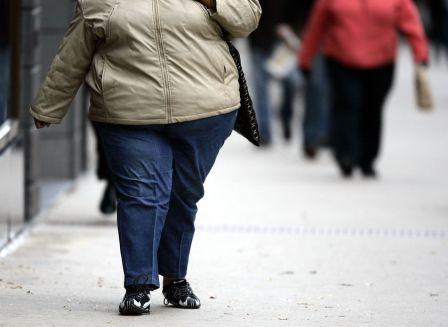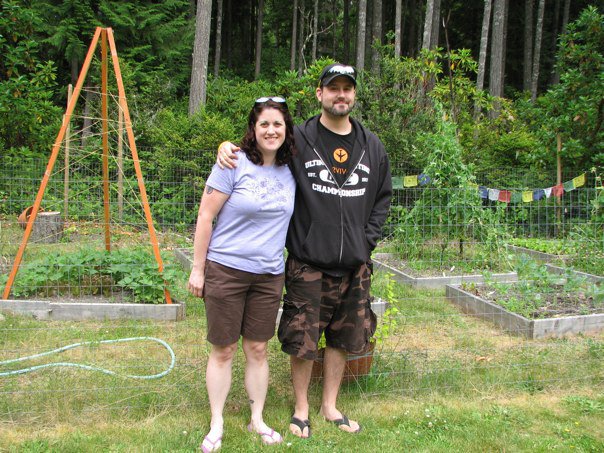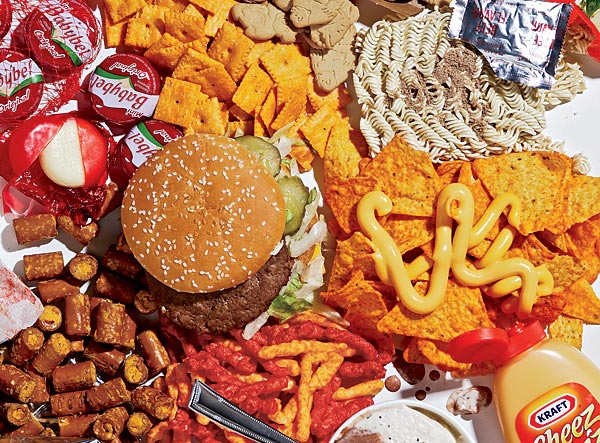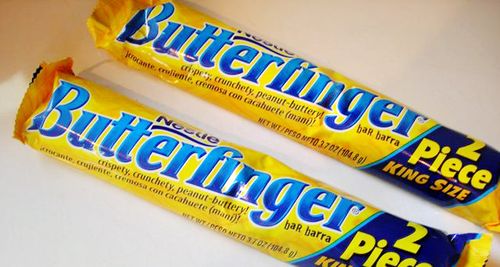Skinnie Emmie wrote a great post the other day on Binge Eating. The post stayed with me and I started thinking about it because I could really relate. I was a binge eater back in the day. I could easily eat half a carton of ice cream in one sitting.
 For me, my food addictions were from boredom and depression. I was bored, depressed about being fat, lazy and as a result would just eat. And eat. And eat some more. You don’t get to 250 without making lazy choices, that’s for sure.
For me, my food addictions were from boredom and depression. I was bored, depressed about being fat, lazy and as a result would just eat. And eat. And eat some more. You don’t get to 250 without making lazy choices, that’s for sure.
Food Addiction is a sensitive topic. Honestly, I’m not sure if I believe in food addiction. There are people that claim food can be just as addicting as drugs. I believe that SUGAR can be addicting. I’ve gone through the effects of sugar withdrawal too many times to count! And nothing compares to the feeling of a sugar craving you can’t control.
I remember “back in the day” I would buy candy bars (my favorite were 5th Avenue Bars or Butterfingers) at the grocery store and stock up on them in my house. Honestly, they were probably the King Size bars, too (That’s 320 calories + the milk I was drinking with it!). I got into the habit of eating one every day and then when I’d run out, I’d get panicked. I didn’t have my daily candy bar! Did I just say oh well? Nope, I went to the store and got more! I got into the HABIT of eating the candy bars every day and felt WEIRD when I didn’t!
“Are you a food addict? (taken from Food Addicts Website)
To answer this question, ask yourself the following questions and answer them as honestly as you can.
1 Have you ever wanted to stop eating and found you just couldn’t?
2 Do you think about food or your weight constantly?
3 Do you find yourself attempting one diet or food plan after another, with no lasting success?
4 Do you binge and then “get rid of the binge” through vomiting, exercise, laxatives, or other forms of purging?
5 Do you eat differently in private than you do in front of other people?
6 Has a doctor or family member ever approached you with concern about your eating habits or weight?
7 Do you eat large quantities of food at one time (binge)?
8 Is your weight problem due to your “nibbling” all day long?
9 Do you eat to escape from your feelings?
10 Do you eat when you’re not hungry?
11 Have you ever discarded food, only to retrieve and eat it later?
12 Do you eat in secret?
13 Do you fast or severely restrict your food intake?
14 Have you ever stolen other people’s food?
15 Have you ever hidden food to make sure you have “enough?”
16 Do you feel driven to exercise excessively to control your weight?
17 Do you obsessively calculate the calories you’ve burned against the calories you’ve eaten?
18 Do you frequently feel guilty or ashamed about what you’ve eaten?
19 Are you waiting for your life to begin “when you lose the weight?”
20 Do you feel hopeless about your relationship with food?
If you answered yes to any of the above questions, then you may be a food addict. You are not alone. FA offers hope through a real solution to food addiction.”
I had a heated discussion with a friend of mine who said she’s been on Weight Watcher since she was 13. She firmly believes in Food Addiction and was shocked that I don’t. I told her I was on the fence about it, not that I didn’t believe in it. She was surprised and said that I can’t be 250 pounds without being addicted to food.
Food Addiction is not like being addicted to alcohol, drugs, cigarettes. You HAVE to eat to survive and you can’t avoid your “drug” because you would die.
What I believe is that we want to make excuses for why we haven’t made the positive changes in our life. I say “we” because I’ve been there and I made all the excuses too! It’s so much easier to say “I don’t have time to work out” than to actually figure out how to make time.
“I can’t lose weight no matter what I do.”
“I work out but don’t see a change.”
“I’ll always be fat.”
I said all those things and more. And guess what? I wasn’t losing weight because I didn’t change my eating habits. I wasn’t losing weight because I was half-assing a workout and wasn’t consistent with going. And finally, I will not be fat forever. I made the changes to prove that statement wrong!
The reason I’m on the fence about Food Addiction is because if it were an addiction, that would mean I clearly CURED myself of my addiction, right? I was able to lose the weight and keep it off (for the most part) so how is it an addiction?
 QUESTION: What are your thoughts on Food addiction? Have you experienced it? Do you think it’s curable?
QUESTION: What are your thoughts on Food addiction? Have you experienced it? Do you think it’s curable?



Lisa
This is a really great, thought-provoking post. I can see that there’s a strong pleasure response in the body to eating and overeating that floods your brain with dopamine, and that can create a strong desire to do it again to get that response. But that’s kind of the essence of any bad habit – it rewards you in some way, which makes it harder to stop. And receiving pleasure from food isn’t bad if it’s not in excess.
I think the way to look at it is to ask whether it’s personally helpful to you to frame something as an addiction. I have some binge eating tendencies, but like you I resist calling it an addiction or disordered eating, because then it’s like it’s something that happens to me or something I can’t control, when I see it more as a bad habit or behavior that I can control.
But I think some people feel more empowered viewing it as an addiction or a disease. Like it’s a way of saying that changing habits or losing weight is really, REALLY hard, and they are not a bad person because it’s hard for them. And that’s true!
hundredtenpounds
I agree that changing habits are REALLY hard. I do think though that calling the problem an addiction can be detrimental to someone who is trying to lose weight…it gives them an excuse to not work as hard, maybe? They have an “out.” We are ALL responsible for every single thing we put in our mouths. It’s not like someone put a gun to our head and told us to eat an entire pizza!
Lisa
To play devil’s advocate… no one holds a gun to the heroin addict’s head and makes them shoot up, either. BUT, I totally agree with you that calling overeating an addiction is overblowing it, because food is simply not as chemically addictive as something like heroin or even caffeine. And I agree that it creates a sense of “I can’t help it”, when our own actions are the only thing that can really help!
Thanks for stopping by my blog, by the way! I have been reading your blog for a while and it’s one of my favorites. Your weight loss and balanced lifestyle is really inspiring, and you always have interesting posts like this one!
hundredtenpounds
Yes our actions are the cause! If I stop exercising and eat an entire cheesecake for dinner tonight, I will gain weight. There’s no way around it. Long ago I decided that the choices I make matter and I can decide how much I want dessert vs if I want to lose those last 8 pounds.
Thanks for debating with me! 🙂 And I added your blog to my feed. It’s cool to see another cyclist!
Leah
I’m with you… it seems like I want to say I’m addicted to food, but to me, that’s just making another excuse on top of so many past excuses to why I don’t do anything to lose the weight. But I do understand where people come from. A lot of those questions I answered yes to, because honestly, food and my weight are CONSTANTLY on my mind. Instead of eating to live, most people live to eat. It takes time, hard work and dedication, but with the right mind set, anyone can change their life. I also say it is hard to get into a right mind set… for me personally, I battle with Bitchzilla (the name of my negative personality lol) EVERYDAY. It’s hard, and sometimes Leah comes out on top… and other times Bitchzilla does. I think, as long as you keep trying, and keep working, you will achieve what you set out to do!
hundredtenpounds
You make a great point about eating live vs. living to eat. I’ve definitely had a mind shift from living to eat! Now I look at food as fuel for my workouts that my body NEEDS! Of course I splurge and eat things I want to eat too, but it’s about moderation and choices.
Carbzilla
I do think, for some people, the way they use food can be considered an addiction. At the same time, I believe it can be “cured” or “managed, ” and have seen proof of that many times over.
I also believe that overeating is one manifestation of a food addiction but not every overweight person is a food addict. I’d even bet there are thin food addicts – overeating just may not be one of their symptoms.
I certainly don’t think “I have an addiction” is ever a good excuse to not do anything about it. All sorts of addictions can be overcome – there’s plenty of proof of that.
And, yes, I also totally agree that there are simply bad habits that can be given up (for me I usually need a substitution). Great topic!
Katie @ Health for the Whole Self
I think there is a definite, important distinction between overeating and bingeing. Many people binge as a way of USING food to numb themselves – that to me is much closer to an addiction than eating a candy bar once a day. While I do not think that bingeing is on the same addictive level as drug or alcohol abuse, I do think that if someone is using it as a means of escape – from life, from emotions, whatever – it is a serious issue. I have no idea what the actual chemical reactions in the brain are, but I do think that calling it an addiction could actually help people – instead of using it as an “excuse,” it emphasizes that the problem is serious enough that the person needs to seek professional help. That’s just my two cents.
hundredtenpounds
But what is “professional help”? A nutritionist? Personal trainer? Weight Watchers? That’s what I wonder?
Katie @ Health for the Whole Self
I think that if the issue is overeating, then sure, a nutritionist could be helpful. But if the problem is bingeing – if you are USING food – then seeing a nutritionist or personal trainer won’t be addressing the real issue. So when I say “professional help” I’m referring to counselors, psychologists, talk therapists, etc.